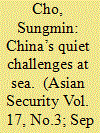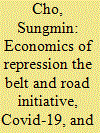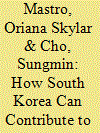|
|
|
Sort Order |
|
|
|
Items / Page
|
|
|
|
|
|
|
| Srl | Item |
| 1 |
ID:
182418


|
|
|
|
|
| Summary/Abstract |
The Chinese military activities in the Yellow Sea have visibly increased. Compared to the South or East China Sea, however, China has not escalated tensions to the strategic level by employing paramilitary and nonmilitary tools of influence. The “regional hegemony” thesis can partially explain the increase of China’s military activities at the operational level. But it does not explain why China refrains from posing strategic challenges in the Yellow Sea in the way it does in the South and East China Seas. I argue that China’s defense advantages in the Yellow Sea and strategic interests in maintaining close ties with South Korea have motivated Beijing to avoid strategic crisis in the Yellow Sea. Simultaneously, however, the strategic competition with the United States has motivated China to accumulate its influence through military activities in the region. This article traces China’s military activities in the Yellow Sea and examines the Chinese discourses on this understudied region.
|
|
|
|
|
|
|
|
|
|
|
|
|
|
|
|
| 2 |
ID:
192136


|
|
|
|
|
| Summary/Abstract |
This study revisits the question of whether China's economic development has brought democratic changes within the country or not. While the modernization theory suggests that economic development should lead to democratization, scholars claim that China has not made democratic progress despite its economic growth. By comparing these two competing perspectives and examining the evidence behind each assessment, I argue that there has been a certain degree of democratic progress in China, in terms of increasing social aspirations for a more open and free society among the Chinese people. I explain why and how scholars reach different conclusions about democratic progress in China, and emphasize the importance of understanding discrepancies between (1) the lack of change in the state’s system, (2) oscillation between liberal and illiberal policies, and (3) progressive changes in society. This article draws on previous studies and data from the World Value System, Varieties of Democracy, and Asian Barometer projects. It also discusses how Chinese people's local understanding of democracy affects the assessment of modernization theory's applicability in explaining China's case.
|
|
|
|
|
|
|
|
|
|
|
|
|
|
|
|
| 3 |
ID:
182064


|
|
|
|
|
| Summary/Abstract |
Since President Xi Jinping started his second term in 2017, Chinese forces
have imprisoned up to two million Uyghurs in detention camps, which
Beijing claims are educational centers for vocational training.1 The international community has alleged human rights violations in Xinjiang, but Beijing
defends that China’s measures are necessary to eradicate the so-called “three evils
of terrorism, separatism, and extremism.”2 Regarding Beijing’s motivations behind the repressive measures in Xinjiang, much analysis has focused on the Chinese Communist Party’s (CCP) views of internal security, social control, and
Han-ethno nationalism
|
|
|
|
|
|
|
|
|
|
|
|
|
|
|
|
| 4 |
ID:
187966


|
|
|
|
|
| Summary/Abstract |
It is rare that American strategists, scholars and government officials generally agree, but the centrality of alliances to US power is one such area. The US alliance network is considered by most to be “one of the most enduring and successful elements of US foreign policy since World War II.”1 The institutionalization of close defense relationships not only helps the United States project power globally, they also facilitate strong trade relations and the promotion of shared values in international institutions, which are the US’ comparative advantage vis-à-vis China. Unsurprisingly then, the United States has emphasized strengthening its alliance relationships to counter nefarious Chinese activities, deter Chinese aggression, and outcompete China’s attempts to revise the US-led world order. In his major speech on US policy toward China, Secretary of State Anthony Blinken summed up the Biden administration’s strategy in three words: “invest, align, compete.” Among these three verbs, “align” strongly underscores the US’ desire to closely coordinate efforts vis-à-vis China with its allies and partners.2
|
|
|
|
|
|
|
|
|
|
|
|
|
|
|
|
| 5 |
ID:
183929


|
|
|
|
|
| Summary/Abstract |
Between 2014 and 2020, China brought back from South Korea 716 sets of remains of Chinese soldiers who had died in the Korean War (1950–53). Why did the Chinese government decide to repatriate the remains of fallen soldiers only after so many years had passed? What are Beijing’s political motivations? We argue that the Chinese Communist Party utilizes the repatriation of war remains as a propaganda opportunity to appeal to veterans and to boost military morale and nationalistic support of the Party. Our study investigates the first cases of repatriating war dead from Myanmar in 2011 and traces policy developments since the establishment of the Ministry of Veterans Affairs in 2018. Our findings enhance understanding of the changing relationship between the Communist Party and vital constituencies in China.
|
|
|
|
|
|
|
|
|
|
|
|
|
|
|
|
| 6 |
ID:
181200


|
|
|
|
|
| Summary/Abstract |
Between the mid-1990s and the mid-2010s, the Chinese government was distinctly open to the Western offer of democracy-assistance programs. It cooperated with a number of Western organizations to improve the rule of law, village elections, administrative capacity, and civil society in China. Why did the Chinese government engage with democracy promoters who tried to develop these democratic attributes within China? The author argues that the government intended to use Western aid to its advantage. The Chinese Communist Party had launched governance reforms to strengthen its regime legitimacy, and Chinese officials found that Western democracy assistance could be used to facilitate their own governance-reform programs. The article traces the process of how the government’s strategic intention translated into policies of selective openness, and includes evidence from firsthand interviews, propaganda materials, and research by Chinese experts. The findings show how democracy promoters and authoritarian leaders have different expectations of the effects of limited democratic reform within nondemocratic systems. Empirically, reflecting on the so-called golden years of China’s engagement with the West sheds new light on the Chinese Communist Party’s survival strategy through authoritarian legitimation.
|
|
|
|
|
|
|
|
|
|
|
|
|
|
|
|
|
|
|
|
|